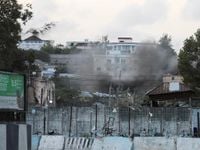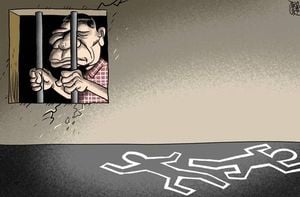Smoke billowed over Mogadishu’s skyline on Saturday, October 4, 2025, as a thunderous attack shook the heart of Somalia’s capital. Explosions and heavy gunfire erupted just steps from the presidential palace, marking the city’s most audacious assault in recent months and exposing the persistent volatility that haunts this embattled metropolis.
The target was the Godka Jilow prison, an underground high-security detention center operated by Somalia’s National Intelligence and Security Agency (NISA). According to Al Jazeera, the assault began with a car bomb blast at the prison’s main gate, followed by a barrage of gunfire and explosions that echoed across the city. The attackers—at least seven gunmen from the al-Shabab militant group—stormed the facility, freeing dozens of prisoners and holding the complex for several harrowing hours.
The chaos unfolded just hours after Somalia’s federal government lifted roadblocks that had restricted movement throughout Mogadishu for over a decade. Prime Minister Hamza Barre had hailed the move as a sign of “visible changes and improvements” in the city’s security situation. Local television stations broadcast images of checkpoints being dismantled, and many residents dared to hope for a new era of relative calm. But the timing proved tragically ironic.
As Reuters reported, the attackers used vehicles painted to mimic those of Somalia’s intelligence agency and wore uniforms nearly identical to the country’s military. This allowed them to slip past security checkpoints with alarming ease. “This enabled them to easily pass through the control checkpoints protecting the capital’s security, as armed forces vehicles are not subject to formal inspection,” the Ministry of Internal Security explained in a statement.
Once inside, the militants unleashed their assault. A Somali security official at the prison told Reuters they heard a “huge blast at the cell gate and soon an exchange of gunfire started.” Reinforcements were quickly deployed, but the battle raged for hours. By the time Somali security forces regained control early Sunday morning, all seven attackers lay dead. Three members of the security forces were also killed in the fighting, and the fate of many prisoners remained unclear—though some escapees were reportedly recaptured.
Al-Shabab, the al-Qaeda affiliate that has waged a relentless insurgency against Somalia’s government since 2007, was quick to claim responsibility. In an online statement, the group declared the operation was part of “Support for the Oppressed,” an effort to “free all the Muslim prisoners the apostates had been holding and torturing there.” The statement also honored the attackers as martyrs who “sacrificed their lives to uphold the word of God, eradicate polytheism and disbelief from the earth, and support the oppressed Muslims suffering in the prisons of the Crusaders and apostates,” as cited by FDD’s Long War Journal.
Saturday’s attack was the 22nd suicide bombing in Somalia so far this year, according to Long War Journal data. It was also the latest in a string of prison assaults and revolts orchestrated by al-Shabab, which has repeatedly targeted detention centers to free its fighters and boost its ranks. The group’s ability to infiltrate such a heavily defended facility—using both disguises and a vehicle mimicking official security forces—was widely seen as a major intelligence failure for the Somali authorities.
The African Union Support and Stabilization Mission in Somalia (AUSSOM) condemned the attack in the strongest terms. Ambassador El Hadji Ibrahima Diene, the Special Representative of the Chairperson of the African Union Commission for Somalia, called it a “cowardly attack” aimed at undermining peace and stability in Mogadishu and surrounding areas. “This attack once again demonstrates the group’s utter disregard for human life and its attempts to reverse the hard-won gains in peace and security,” Diene said. He praised the Somali Security Forces for their “swift and effective response,” which he said helped minimize casualties and prevent further destruction. AUSSOM also commended medical personnel for their efforts and extended condolences to the families of those killed.
Yet the attack has raised uncomfortable questions about the true state of security in Mogadishu. The Godka Jilow prison is located near the presidential palace in one of the city’s most secure districts. The fact that such a fortified site could be breached so dramatically, and so soon after the easing of security restrictions, has cast doubt on the government’s claims of improvement. Samira Gaid, a security analyst focused on Somalia, told Al Jazeera that the attack revealed a “disparity” between official assessments and the on-the-ground reality. “The fact that they’re not ramping up attacks in the capital does not show that they’re weakened but that they’re biding their time and can choose when to strike,” she observed.
Somalia’s struggle with al-Shabab is far from new. The insurgent group controls large swaths of southern and central Somalia and has repeatedly demonstrated its ability to strike high-profile targets, including military bases and government convoys. In March 2025, al-Shabab attacked President Hassan Sheikh Mohamud’s convoy in Mogadishu—his fifth assassination attempt by the group. The government later announced that the al-Shabab member responsible for that attack was killed in an intelligence operation.
The broader toll of the conflict remains staggering. Between January and July 2025 alone, nearly 60,000 people were displaced by fighting between government forces and al-Shabab in Somalia’s Middle Shabelle region, according to the Africa Center for Strategic Studies. The same report found that Somalia accounted for a third of all casualties across Africa linked to groups with ideological ties to al-Shabab.
For al-Shabab and similar jihadist groups, prison breaks are more than just tactical victories—they are powerful propaganda tools and strategic opportunities to replenish their fighting ranks. The Islamic State has also made jailbreaks a central feature of its global strategy, mounting major assaults in Syria, Afghanistan, Nigeria, and elsewhere. Al Qaeda’s West African branch, JNIM, conducted several such operations between 2018 and 2020, earning public praise from the group’s global leadership.
In the aftermath of the Mogadishu prison assault, the Somali government faces renewed scrutiny over its security policies and intelligence capabilities. The attack has underscored the ongoing threat posed by al-Shabab, even in the capital’s most fortified zones. It has also reignited debate about the wisdom of easing security restrictions in a city that remains a prime target for militant violence.
As the smoke clears and families mourn their losses, Somalia’s leaders are left with the daunting task of restoring public confidence and preventing future tragedies. The battle for Mogadishu’s security is far from over—and the events of October 4 serve as a stark reminder of the challenges that lie ahead.





